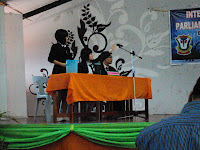I would like to share something interesting from The Star files
Teaching requires commitment just as a marriage does. Over the time, some teachers become indifferent to work. However, all is not lost, if they reflect and evaluate the choices.
When I read the article “Marriage Fatigue” (StarTwo, June 2), I couldn’t help but compare how similar the fatigue among married couples described by her is to the work fatigue teachers experience, after they’ve given up teaching for a long time.
First things first. What was the article about? Well, it was about the symptoms of marital burnout and how surreptitiously they creep into a mature marriage and destroy its very fabric.
The symptoms described were a sense of emptiness and quietude in the marriage which were often the result of the absence of “affection and involvement”.
According to the article, if couples who have been married a long time no longer have a sense of shared purpose and have lost their sense of “we-ness”, then the marriage is on dangerous ground. Going on living together, but being separately “lost, lonely and depressed” is an indication of marital fatigue.
When each is too tired to try to make the relationship work, the marriage drifts and the couple may even split.
Getting into teaching is a lot like getting into a marriage. There are ups and downs, good patches and bad, love and hate, zest and deflation, times when you’re up and swinging, and times when you’re zapped and tired.
If marriage requires commitment, so does teaching. As a teacher, you are honour-bound to your students and the vocation you have chosen.
With each passing year, you might feel bogged down by professional demands, work ethics and the huge moral responsibility teaching exacts from you.
If marriage needs constant adjustment and dedicated effort to make it work, so does teaching.
If things don’t work out in a marriage, you’re forced to reflect and evaluate the choices open to you, and then consider whether your marriage is worth being in.
Similarly, when you’re a teacher, in every class you walk into, you have to be introspective. What works? What doesn’t? Why?
When things fall apart, whose fault is it? Can it be helped? Who needs to change? How? If necessary, are you willing to adopt a different approach?
If you aren’t, then what’s going to happen? What are the risks involved for every decision you make? Who ends up with the shorter end of the stick?
Talking about marital fatigue, the article highlighted a 60-year-old man who finally left his marriage of 33 years, once he retired.
Having lived years of separate lives, he found his marriage empty and devoid of meaning.
Finding no spark to rekindle his marriage, having no desire to court his wife again and realising there was no common vision for the future, he left.
For a couple to stay married happily ever after, the trick is to shift from “resolving conflict” in the early years to “enhancing intimacy” in the twilight ones. So says relationship researcher and emeritus professor of psychology from the University of Washigton, John M. Gottman.
Back to teaching. Don’t you see now why some older teachers feel the embers dying within themselves?
They come to work feeling dull and tired because they no longer feel the sense of purpose they once felt.
They see teaching life as empty and meaningless — a process of simply going through the motions.
Technically speaking, such teachers should leave the profession, but many plod on to retirement simply because they refuse to acknowledge the rut they are in.
The “marriage” is dead but they’ve been in it so long that they do not even know what to do without it.
Isn’t it sad when long years of teaching translate into inertia and apathy?
To survive the teaching profession and to enjoy being in it right up to the ripe age of 58, which is the new retirement age offered by the government, the same principles which apply to marriage should be applied here too.
For one thing, the spark must not be allowed to die. Do not let indifference take over. Do not become jaded and non contributive.
In teaching, remain affected and involved. Get into things. Build up good times you can share with your students and your colleagues.
Think purposefully as to where your teaching life is headed. If you are a dull, dreary teacher who seems to be the one who has given up on teaching, stop and think. Are you simply marking time to retire? You shouldn’t.
To make the twilight years of your teaching life meaningful, it is you and only you who can make the difference
by Nithya sidhu
The Star 3/08/2008




